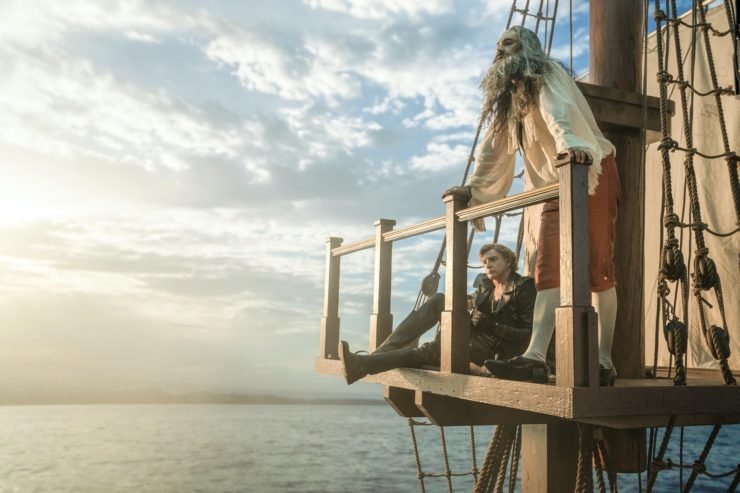I learned early that television in general was inhospitable to my desires. To be a queer character on TV was to be in constant peril; a post-sweeps-week disappearance, a stray bullet, a snide joke that minimizes to the point of complete obliteration. Aside from some notable exceptions, which I would diligently watch despite a distinct lack of enjoyment (sorry, Bette and Tina), I learned that my desires were a media exception. An aberration. A fly in the soup of consumable content. This was in line with the pre-marriage equality world in which I grew up. I didn’t expect anything more from media or from the world because I didn’t have the right.
So I said “F*ck TV” and picked up a book.
The queer fantasy romance novel is, at its heart, a joyous exercise in wish fulfillment. Oftentimes, the worlds in which these characters fall in love are free from homophobia, from persecution, from even a turned-up nose. The conflicts through which they travel in their respective arcs have little to do with their queerness, rather the myriad other traits and interests of which they are comprised. In the right hands, a queer-accepting or ambivalent world can be as magical as a dragon with a pearl in its throat, a forest full of benevolent eldritch horrors, or a trans brujo in love with a dead boy.
I lost hope that I would see something like that on television. With some exceptions, fantasy TV shows are helmed by people who aren’t even creative enough to imagine a racially diverse cast. Gay characters are regularly impaled with shadow knives and sent to super hells. (Side note: I’ve never watched The 100. Does that Lexa woman make it out okay?) Even if the queer characters survive multiple seasons, it is to be a side character, living in a familiarly homophobic world. Queer characters are as valued as rainbow sprinkles on a sundae, mostly there for decoration, to be licked immediately away without even an aftertaste to remember them by.
You knew I was going to talk about the gay pirate show, didn’t you?
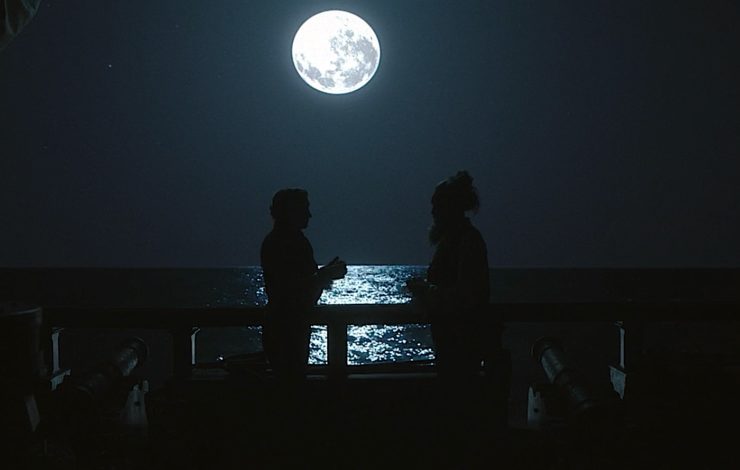
First, the assertion that Our Flag Means Death is a fantasy program. If you disagree: fight me. Rowboats acting as roving spawn points? Bizarre and fluctuating travel durations? Full leather in the Caribbean sun? Buttons’ gentle and loving relationship with two eloquent seagulls? Oluwande’s Crocs??? Abject fantasy. But it is not these magic-adjacent elements that mark this show as speculative fiction. It’s the attitude towards our queer characters and their love stories.
Lets get the non-fantastical bits out of the way. Matelotage (which shares the same French root as the pirate term ‘matey’) was a practice by which pirates legally bound themselves in partnership. If one pirate died, the other got his stuff. Historians have argued that this was a practical rather than romantic arrangement. However, as we have learned, history is gayer than the historians would have us believe. As far as I am concerned “Arr, me matey,” is a declaration of love.
The rules of en-gay-gement were very different on land. Britain’s longstanding Buggery Act was in place in the commonwealth, a law that conveniently served as a pervasive tool of cultural colonialism. The punishment for confirmed sodomy was death. Attempted buggery resulted in a stint in the pillory (think medieval stocks), where the offender was subjected to the violent whims of the mob. Social ruin followed. Buggery remained a capital crime until 1861, when the Offences against the Person Act reduced the sentence to a minimum of ten years hard labor. Buggery laws were repealed in England and Wales in 1967, but they remain in effect (though not enforced) in Antigua and Barbuda, Barbados, Dominica, Grenada, Jamaica, Saint Kitts and Nevis, Saint Lucia, and Saint Vincent and the Grenadines.
Famously, both Oscar Wilde and Alan Turing were sentenced for engaging in consensual homosexual acts—what Wilde called “the love that dare not speak its name.” Wilde’s punishments included hours of walking on a treadmill, unraveling rope by hand, and food and sleep deprivation, which lead to a collapse that ruptured his eardrum. His health severely deteriorated over his two years of imprisonment, and he never fully recovered from the ordeal; he died in 1900, three years after his release, from meningitis that might have stemmed from his ear injury. Alan Turing managed to escape incarceration, but his probation was contingent on agreeing to hormone therapy meant to curb his sexual desire. For a year, he was medicated with synthetic estrogen, which rendered him impotent and depressed, and caused him to grow breast tissue. His professional reputation was left in shambles, and he was found dead in 1954, two years after his conviction, possibly from suicide by cyanide ingestion. Both men were posthumously pardoned; Turing in 2013 and Wilde in 2017, the latter under what is known as the “Alan Turing law.”
In episode eight of Our Flag Means Death, Calico Jack makes an oblique reference to some sort of land-bound homophobia with his assertion that “anything goes at sea.” Aside from this, there is no way a viewer without an awareness of historic British sodomy laws would know anything about the contemporary criminalization of sodomy. And that, in my opinion is a good thing. Therein lies the fantasy.
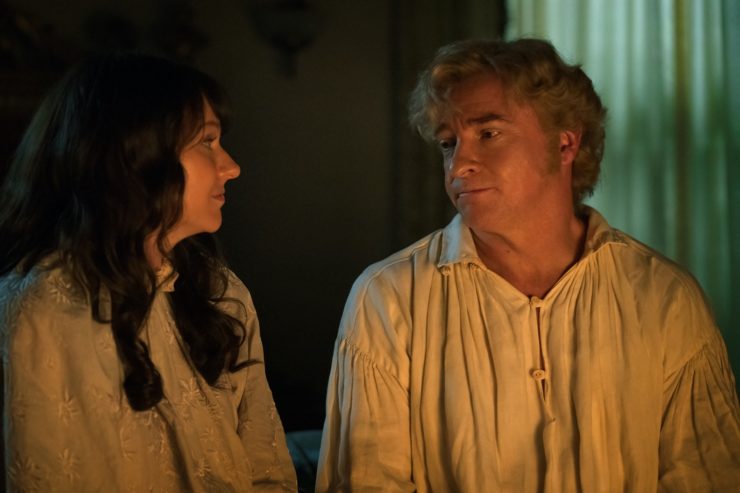
One of the most tender scenes of the season is in episode ten, when Stede simultaneously reveals to Mary and to himself that he has fallen in love with Ed. In this fantasy world where Stede has no fear of capital punishment, he can choose to tell Mary about his truest self simply because he wants to. He is being brave, just by virtue of exposing his heart. He does not fly into a panic, realizing that his newly-uncovered desires are the sort that gets a man pilloried or worse. He is accepting the calmness, the steadiness, of a total and truthful knowing. The choice of his revelation is not stymied by society’s rejection and fear of his queerness. This fantasy world has given him the freedom to be a whole person, unencumbered by the shame of knowing his love is punishable by death.
This does not mean there is no homophobia on Our Flag Means Death. Stede’s father tirades at his “lily-livered little rich boy” and Nigel Badminton’s jibes about Stede’s proclivity towards flower-picking are homophobia-coded put-downs. But a world without criminal repercussions allows Stede to move past the shame and bullying. It allows him to understand that, while these men might have been perceptive, their views do not mirror that of the legal system. Stede can value these bits of softness in himself, these little flower petals and scraps of fabric, because he found a man who loves him wreathed in the odor of lavender soap and garlanded in fine cashmere.
I started writing queer fantasy at a particularly low time in my life. I was working as a journalist, and, after years of being told my stories about queer lives were niche, I was chafing. Was I niche? Was my life some sort of special interest? By writing fiction, I hoped to shake off the workplace shame that came from having straight editors kill the stories I cared about most. But beyond that, I wanted to see what I could come up with when the only person I needed to answer to was myself.
Buy the Book
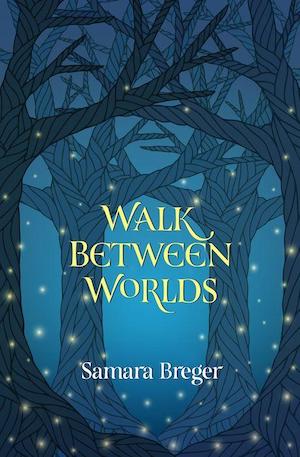

Walk Between Worlds
In the first draft of my debut novel, Walk Between Worlds, the main character, a female soldier named Scratch, aspires to marry the princess. To make this feasible, I created a long backstory about why same-sex marriages were legal in my high fantasy, knights-and-castles world. I decided that the princess’ grandfather (then the king) fell in love with a man, and that the queen, on her deathbed, urged them to marry. There was even an in-world song, a little ditty the bards threw together to inform the nation at large that “marriage is for all.” I had my characters, deep in their journey through a fae-inhabited forest, a chapter before stabbing a man in the throat with a sharpened stick and meeting a soul-eating half-goat woman named Nana, sit down by the fire and sing an expository folk tune about gay marriage.
It was only later, after the whole princess-marriage gambit had been dropped, that I fully understood the absurdity of what I had done. In a world of my own creation, where giant bugs wore waistcoats with golden buttons, why couldn’t I have decided that anyone was free to marry anyone else? Was it truly a more fantastical concept? Or had years of living in a country where my rights were always up for debate, where I constantly heard arguments against my own humanity, somehow warped my brain?
Otherness is part and parcel of queerness; often, our first inkling that we are queer is a distinct feeling that we are somehow different. We are not like our parents. We are not like our friends. Good or bad, right or wrong, we are unavoidably, inescapably other. It took me a long time to consider my queerness a special, lovely thing. For the most part, my family was supportive. But even they couldn’t shield me from the fact that my rights were up for debate. I was not only socially, sexually, romantically other, I was legally other, a different class of humanity, a bit of identity politic made flesh.
I had hoped, after the victory of Obergefell v Hodges, that more queer victories were on the horizon. Workplace protections. Free and easily obtainable trans healthcare. Benefits for gay elders. Prison abolition. I was so excited to see the next generation of queer kids forge their identities without the government in their bedrooms. What would these kids be like? How brightly would they shine without the rule of law whispering denigrations in their ear?
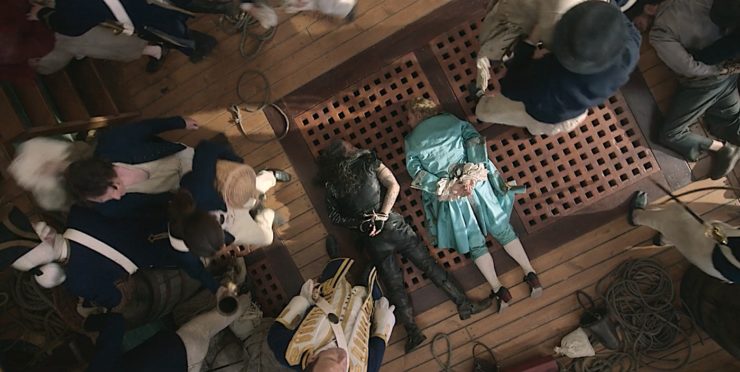
I know now how desperately naive I was. It is a miserable time for LGBTQIA+ rights in the US. Trans people are fighting for their lives. Reproductive rights are in jeopardy. Parents are terrified the state will remove their happy, trans kids from their homes. Queer books are being ripped from libraries. Supreme Court justices are openly hostile towards marriage equality. We are being legislated into non-existence. Not only do these regulations have material negative consequences in our lives, the stress of them hanging overhead is no small thing. We are tired. Our brains are foggy and sluggish. Our movements are smaller, our risks more measured. The sword of Damocles is grazing our scalps.
A show about gay pirates will not cure society’s ills. What it might do, however, is give us a moment to breathe. To relax. To remember that we exist outside of politicians’ frothy re-election campaigns and leaked Supreme Court documents. That we exist, and have always existed. Right now, it’s fantasy. But speculative fiction has always given us the opportunity to imagine worlds that might someday exist. To remind us what there is to fight for. To give us a bit of rest before we need to fight again. To watch queer people, unencumbered by the law breathing down their necks, shine brightly.
To exist proudly in this cruel time is, as Stede says, “a lot of mental pressure.” Thanks to Our Flag Means Death, we can take a little of that pressure off, if only for a few hours. This show is a fine thing. Like Ed, we deserve fine things; we wear them well.
Samara Breger’s queer fairytale Walk Between Worlds is available at your favorite bookstore, and her sapphic vampire romance is coming in 2023. When she isn’t writing, she likes to read about gay people falling in love.










